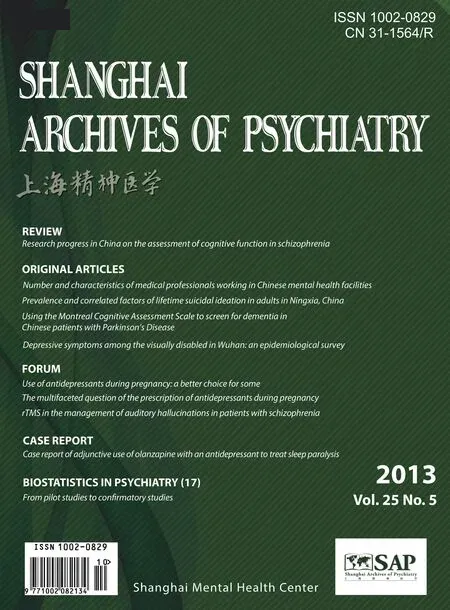The multifaceted question of the prescription of antidepressants during pregnancy
Gisèle APTER, Emmanuel DEVOUCHE
?Forum?Antidepressants during pregnancy
The multifaceted question of the prescription of antidepressants during pregnancy
Gisèle APTER1,2, Emmanuel DEVOUCHE1,3
Pregnancy has long been considered a period of bliss,free of psychiatric disorder. It was even supposed that if such conditions preexisted, they would momentarily be miraculously suspended.[1]Numerous studies have now shown that not only do pre-existing psychiatric disorders such as bipolar disease and schizophrenia persist during pregnancy, but when adequate medication is discontinued relapse is likely to occur.[2]Systematic reviews suggest that up to 18.4% of pregnant women are depressed during their pregnancy and 12.7%develop major depression.[3,4]Thus, depression is common during pregnancy and, as reported by Zhang and Wang,[5]the use of antidepressants during pregnancy is equally common.
Prescription of psychotropic medication during pregnancy is generally made after an assessment of the relative benefits and risks, weighing the necessity to prescribe or maintain psychotropic medication versus the potential negative impact on the fetus and neonate.Good practice rules are usually established in each country (e.g., by the Agence Nationale de Sécurité du Medicament [ANSM] in France). In most cases these rules are based on the results of retrospective studies.Ethical issues usually result in the exclusion of pregnant women and infants from drug studies, so there is little definitive evidence on the risk and benefits of using psychotropic medication during pregnancy or the peripartum. Thus clinicians must be particularly vigilant in their monitoring of the psychological status and use of psychotropic medication in women during pregnancy or the peripartum, ensuring that their practice is consistent with current state of the art. When making the decision whether or not to treat with medications,clinicians need to consider both the mental health of the mother and the healthy development of the mother-infant relationship. Typically the mother-infant relationship and the emotional development of the infant are not considered when assessing the benefits and risks of pharmacological treatment of the mother,suggesting lack of appreciation of the role of maternal mental health on the emotional well-being and healthy attachment of infants.[6]To address this critical issue, a baseline description of the current use of psychotropic medication during the peripartum is needed; this baseline information can then be used to design appropriate interventions to improve the mental health of mothers and their infants
We analyzed the prescription of antidepressants in a cohort of 87,213 pregnant women living in the suburban area of Paris, using a database provided by the French Health Insurance System (a national health system that covers 95% of the population). The analyses covered five time periods: the 4 months before becoming pregnant; the first, second and third trimester; and the 4 months after delivery. The antidepressant prescription rates in the five time periods were 2.46%, 1.16%, 0.60%,0.46% and 2.02%, respectively. All two-way comparisons of antidepressant prescription rates between differenttime periods were statistically significant, including the higher prescription rate prior to pregnancy (2.46%)versus that after delivery (2.02%) (difference of 0.44%;95%CI=0.30% to 0.58%). Prescription rates observed in pregnant women were significantly lower than in a comparable cohort of non-pregnant women randomly selected from the same database during the same period.
One could surmise that women planning a pregnancy would voluntarily discontinue antidepressant treatment either based on their own initiative or on that of their physician. It is difficult to know whether or not this presumed discontinuation was justified by the clinical status of the individuals – an issue that would require detailed health services research to resolve. The stepwise decrease in antidepressant prescription rates during pregnancy is probably related to beliefs about the risk of a withdrawal syndrome in infants[7-9]and about the 6-fold increased risk of persistent pulmonary hypertension in neonates born to mothers who receive selective serotonin-reuptake inhibitors medication after the 20thweek of pregnancy.[10]Thus concern about a rare but major infant risk (pulmonary hypertension only occurs in 1 or 2 infants per 1000 live births) outbalancesconcern about a common under-appreciated risk – the risk of damaging the developmentally crucial parentinfant relationship. The argument that maternal postnatal depression has severe negative effects on parent-infant interactions and on the emotional development and healthy attachment of infants has not been integrated into the decision-making process about whether or not to pharmacologically treat postnatal maternal depression.[11]
More information is needed. Ongoing multicentered studies that monitor the management of mental disorders and the usage of psychotropic medications during the peripartum are essential.Assuming that there is good-quality data confirming the non-teratogenicity of a specific psychotropic medication,[12]further studies that carefully compare the physical and psychological risks to both the mother and the infant of pharmacological versus non-pharmacological treatment will be needed. This information can subsequently be used to design appropriate treatment guidelines.[13]From the public health perspective, decisions about the use of psychotropic medication during pregnancy and the peripartum must consider both the well-being of the mother and the well-being of the infant, whose long-term psychological health may depend on the quality of the mother-child relationship that is established during the crucial post-natal period.
Conflict of interest
The authors declare that they have no conflict of interest.
Acknowledgements
We are grateful to Michèle Surroca and Laurent Becquemont who facilitated access to the data and participated in the design of the extraction of information from the national health database.
1. Apter G, Devouche E, Gratier M. Perinatal Mental Health.J Nerv Ment Dis 2011; 199(8): 575-577.
2. Viguera AC, Whitfield T, Baldessarini RJ, Newport DJ, Stowe Z,Reminick A, et al. Risk of recurrence in women with bipolar disorder during pregnancy: prospective study of mood stabilizer discontinuation. Am J Psychiatry 2007; 164(12):1817-1824.
3. Bennett HA, Einarson A, Taddio A, Koren G, Einarson TR.Prevalence of depression during pregnancy: systematic review. Obstet Gynecol 2004; 103(4): 698-709.
4. Gavin NI, Gaynes BN, Lohr KN, Meltzer-Brody S, Gartlehner G, Swinson T. Perinatal depression: a systematic review of prevalence and incidence. Obstet Gynecol 2005; 106(5):1071–1083.
5. Zhang H, Wang L. Use of antidepressants during pregnancy:a better choice for some. Shanghai Archives of Psychiatry 2013; 25 (5): 315-316.
6. Easterbrooks MA, Bureau JF, Lyons-Ruth K. Developmental correlates and predictors of emotional availability in motherchild interaction: a longitudinal study from infancy to middle childhood. Dev Psychopathol 2012; 24(1): 65-78.
7. Robinson GE. Psychopharmacology in Pregnancy and Postpartum. FOCUS: The Journal of Lifelong Learning in Psychiatry 2012; 10(1): 3-14.
8. Yonkers KA, Wisner KL, Stewart DE, Oberlander TF, Dell DL, Stotland N, et al. The management of depression during pregnancy: a report from the American Psychiatric Association and the American College of Obstetricians and Gynecologists. Obstet Gynecol 2009; 114(3): 703-713.
9. Danel T, Plancke L, Amariei A, Beno?t E, Gautier S, Capèle C,et al. La prescription de psychotropes durant la grossesse dans le Nord – Pas-de-Calais. Thérapie 2013; 68(1): 31-36. (in French)
10. Chambers CD, Hernandez-Diaz S, Van Marter LJ, Werler MM,Louik C, Lyons Jones K, et al. Selective serotonin-reuptake inhibitors and risk of persistent pulmonary hypertension of the newborn. N Engl J Med 2006; 354(6): 579-587
11. Murray L, Fiori-Cowley A, Hooper R, Cooper P. The impact of postnatal depression and associated adversity on early mother-infant interactions and later infant outcome. Child Development 1996; 67(5): 2512-2526.
12. Kieviet N, Dolman KM, Honig A. The use of psychotropic medication during pregnancy: how about the newborn?Neuropsychiatr Dis Treat 2013; 9: 1257–1266.
13. Rubinow DR. Antidepressant treatment during pregnancy:between Scylla and Charybdis. Am J Psychiatry 2006; 163(6):954-956.
10.3969/j.issn.1002-0829.2013.05.008
1Erasme Hospital, Psychiatry and Psychopathology Research Institute, Paris, France
2University Paris Diderot, Paris, France
3University Paris Descartes, Laboratoire Psychopathologie et Processus de Santé, Paris, France
*correspondence: gisele.apter@gmail.com ; emmanuel.devouche@parisdescartes.fr

Dr. Gisèle Apter MD PhD, is currently a clinician and researcher at the Erasme Hospital and the University Paris Diderot. She is trained in general, child and perinatal psychiatry and infant psychology.She has teaching and clinical expertise in the development of very young infants, and in parental psychopathology. She has been involved in research studies of the mother-infant interaction specifically with women with Borderline Personality Disorder and a history of abuse or trauma. Her role as President of the Perinat 92, a perinatal medicine network, is to coordinate the access of women and infant to obstetrical, gynecological, neonatal, and mental health services in the western suburbs of Paris. She has created PPUMMA, a mobile emergency and liaison network for reproductive and parent-infant services.Her publications address clinical mother-infant interaction, interactive distortions, infant emotional development, maternal access to care and women’s mental health during the peripartum.
- 上海精神醫(yī)學的其它文章
- From pilot studies to confirmatory studies
- Case report of adjunctive use of olanzapine with an antidepressant to treat sleep paralysis
- rTMS in the management of auditory hallucinations in patients with schizophrenia
- Use of antidepressants during pregnancy: a better choice for some
- Depressive symptoms among the visually disabled in Wuhan:an epidemiological survey
- Using the Montreal Cognitive Assessment Scale to screen for dementia in Chinese patients with Parkinson’s disease

